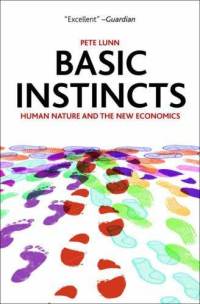 This was my first sortie into the world of behavioural economics and it has been a very worthwhile one. Basic Instincts by Pete Lunn is a lucidly written, well researched and highly accessible overview of a growing field. The book’s primary audience is students of economics as it takes hold of many of the disciplines core tenets such as equilibrium, profit maximisation, rationality and so on and demonstrates in a compelling fashion that the world we live in does not always conform to these theoretical models. The implications are wide ranging, impacting on everything from consumer behaviour to labour markets to the ‘theory of the firm’.
This was my first sortie into the world of behavioural economics and it has been a very worthwhile one. Basic Instincts by Pete Lunn is a lucidly written, well researched and highly accessible overview of a growing field. The book’s primary audience is students of economics as it takes hold of many of the disciplines core tenets such as equilibrium, profit maximisation, rationality and so on and demonstrates in a compelling fashion that the world we live in does not always conform to these theoretical models. The implications are wide ranging, impacting on everything from consumer behaviour to labour markets to the ‘theory of the firm’.
For those involved in marketing, the book is a fascinating read as well. By devoting a full chapter to how marketing calls into question much economic orthodoxy, it certainly gives marketers a chance to feel a little smug and be grateful that they didn’t pay too much attention during those early microeconomics lectures. A footnote to this chapter describes Kotler’s classic book as a horror story but for reasons you will only understand when you know where Lunn is coming from. For businesses of all sizes though, this chapter provides further evidence of the power of marketing, based not on intuition, but on economic reasoning and supporting evidence. Consumers struggling with uncertainty have a motivation to ‘trust’ brands. Our instinctive desire to be part of a group means that we are susceptible to appeals that attach brands to personalities, lifestyles and social classes. Advertising, though it may be wasteful from society’s point of view, clearly works and one of the most persistent findings in industrial economics is a link between profitability and marketing.
Against this background, marketing’s failure to pack a bigger punch in corporate boardrooms all over the world remains hard to fathom. Paradoxically, the discipline has done a bad job of marketing itself. Perhaps, instead of seeking to learn the language of finance, it should be adopting the logic of behavioural economics. Consumers are not rational, selfish beings operating in an environment of perfect information. As Lunn points out , a prime example of this is the iPhone for which many consumers shelled out $599 only to see the price drop to $399 just two months later. Basic Instincts explains that there are a variety of ways in which we can be MISLED. Consequently, we have developed a capacity to trade with each other which has evolved through many generations. But this capacity contains many ‘sub-optimals’ such as a propensity to value what we have and know, to value fairness in exchanges and that we are highly influenced by social context and engage in herding behaviour. Marketers need to demonstrate more powerfully why customers behave in the many unprecedented ways that they do. Behavioural economics along with evolutionary psychology and neuro-marketing is helping to do this. These fields are teaching both marketers and consumers a lot about themselves.